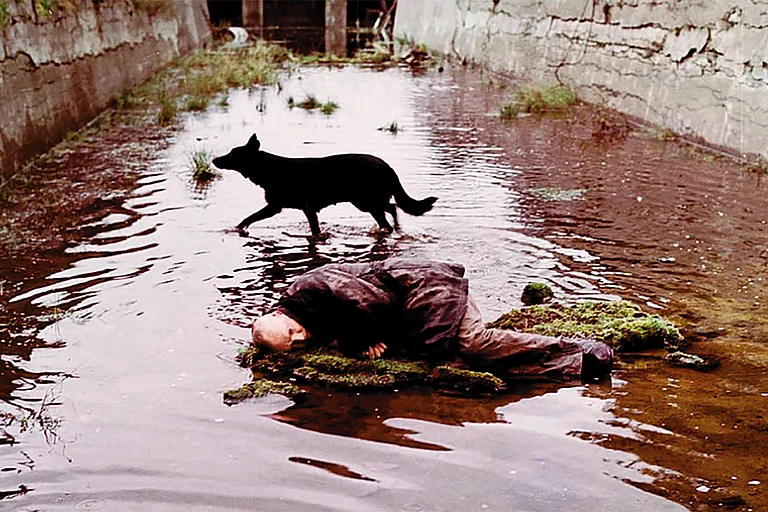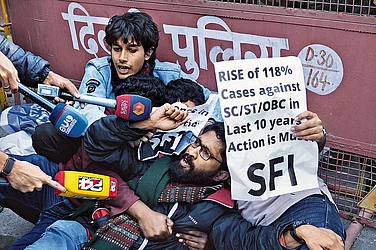The future-yet-to-arrive is the present-we-live-in. To make a film about our future today is to invoke a present that is lost in past. For the first 21 years of the 21st century we lived in a future that not only arrived staunchly but has steadfastly become our grim past. Our future is a parallel universe that exists here and now because there is nothing new about the future. We live in a derelict future that has already been imagined in someone’s fiction. We are not living in someone’s dream; we are living in someone’s story that has already been told, not once but many times.
Our present is a bureaucratic nightmare that Franz Kafka anxiously inscribed in The Trial (1924); a catastrophic epidemic that Albert Camus fervently portrayed in The Plague (1947); a fascist despotism that George Orwell described in Nineteen Eighty-Four (1949); a viral deformity that enervates our sense of being that Jose Saramago forebodingly apprehends in Blindness (2004). Here, future is a weary past that is debilitatingly embodied in our delinquent present.
Our 2001 was not the sanitised opulence of Stanley Kubrick’s Space Odyssey (1968) that was infatuated with its own impotent inventiveness. It was the first year of a new millennium when two fast-moving Boeing 767s pierced the World Trade Center in less than 20 minutes and started a war that has killed millions for over two decades. Our present has become the future of Andrei Tarkovsky’s space station in Solaris (1972) that resembles a ravaged, crippled, and abandoned world in which we search for unrequited love that is unfortunately a simulacrum which cannot be consummated. Our 2015, was not the romantic technocracy of Back to the Future II (1989) that Marty McFly enlivens, but it was more like a dishevelled landscape of Andrzej Żuławski’s desecrated and fractured On the Silver Globe (1989), in which we incessantly search for an absent messiah who perhaps knows what we really don’t want.

Montage Stills from the film Glossary of Nonhuman Love
Today, we live in a present in which gods, ghost and bots have become one. Here divine intervention is a technocratic invention. It is not merely one proverbial butterfly that flapped its wings in Johannesburg and caused an earthquake in Jhumri Telaiya. Billions of butterflies are flapping their wings concurrently and this venerable earth is getting warmer irrevocably, day-by-day, minute-by-minute. Today, a microwave used to re-heat a dried, cold Neapolitan pizza in a desolate suburb of New Jersey causes flooding in the hyper-congested Dhaka. This is not some dystopic future, but it is our bipolar present.
Our now is a forlorn future that is hurtling towards a world proliferated not just by humans but also by non-humans—convoluted forms that occur in a state beyond being human. Invisible algorithms, labyrinthine codes, unbreakable ciphers, and tortuous cryptograms copiously wrapped in electromagnetic waves now stoutly control our collective imagination, endlessly archive our infinitesimal desires, and comprehensively colonise our affective universe. We live in a non-human present in which we must constantly prove our humanness.
Don’t you not get exasperated when you must solve inane picture puzzles to show that you are human on your bank’s website that holds your life’s hard-earned savings? Have you not panicked when the super-fast elevator taking you to the 27th floor of your glass-faced office got stuck between 17th and 18th floor? Have you not cursed the junked nail that punctured your Enfield motorcycle tyre when you were savouring that once-in-a-lifetime solo trip in Ladakh? Have you not tightly shut your eyes in front of your neighbourhood Ganesh temple and prayed for the well-being of your adorable daughter? Non-humans are everywhere even inside us—remember your father’s cardiac pacemaker device that freaks out metal detectors in air-conditioned terminals? In this world densely populated by non-humans we must not just be human or appear human but also perform humanness.

My film, Glossary of Nonhuman Love, is a wrinkled parchment about such an insecure future that exists in our precarious present but is delicately sutured to our dilapidated past. A future that is as devastatingly decrepit as our perilous present and our pungent past. Here artificial intelligence has possessed our humaneness. In this present-as-future, non-humans unknown to us chaperon our lives, our rage, our indignation, our solidarity, our comradeships, our exhilaration, our despondency, our longings, our affections, and our intimate yearnings that is even unknown to us. These non-humans entities don’t merely conduct our being, they have become us, or rather we have become them. It is a world where humans have become non-humans, like a cryptic algorithm whose formula has been dislodged in the sinews of our neural network that has been permanently incapacitated by Alzheimer’s.
This film is about such a parallel universe that simultaneously exists in our present space-time continuum. Here non-human cans be bots; but they can also be divine spirits from our traumatised past that has discreetly possessed us. They can be furious goddesses from a primordial era that will not abandon our distraught souls. They can be revolutionaries from a fortuitous future that is more unfortunate than our fissured past. Who knows? The only thing we know is that these gods, goddesses, bots, spirits, or algorithms have colonised our senses, subjugated our humaneness, subverted our desires, and made us efficacious non-human. However, they have not been successful in forsaking the idea of love.
Glossary of Nonhuman Love is an extract from their Operation Manual. In sixty-four words, this film defines multiple contingencies in which the emotional lives of human beings are colonised by the divine possibility of non-humans. The film wonders what does it mean to be human in this world infested by non-humans?
(This appeared in the print edition as "Back To The Future")
(Views expressed are personal)
Ashish Avikunthak is a film-maker, anthropologist and archeologist who teaches at the University of rhode island






















